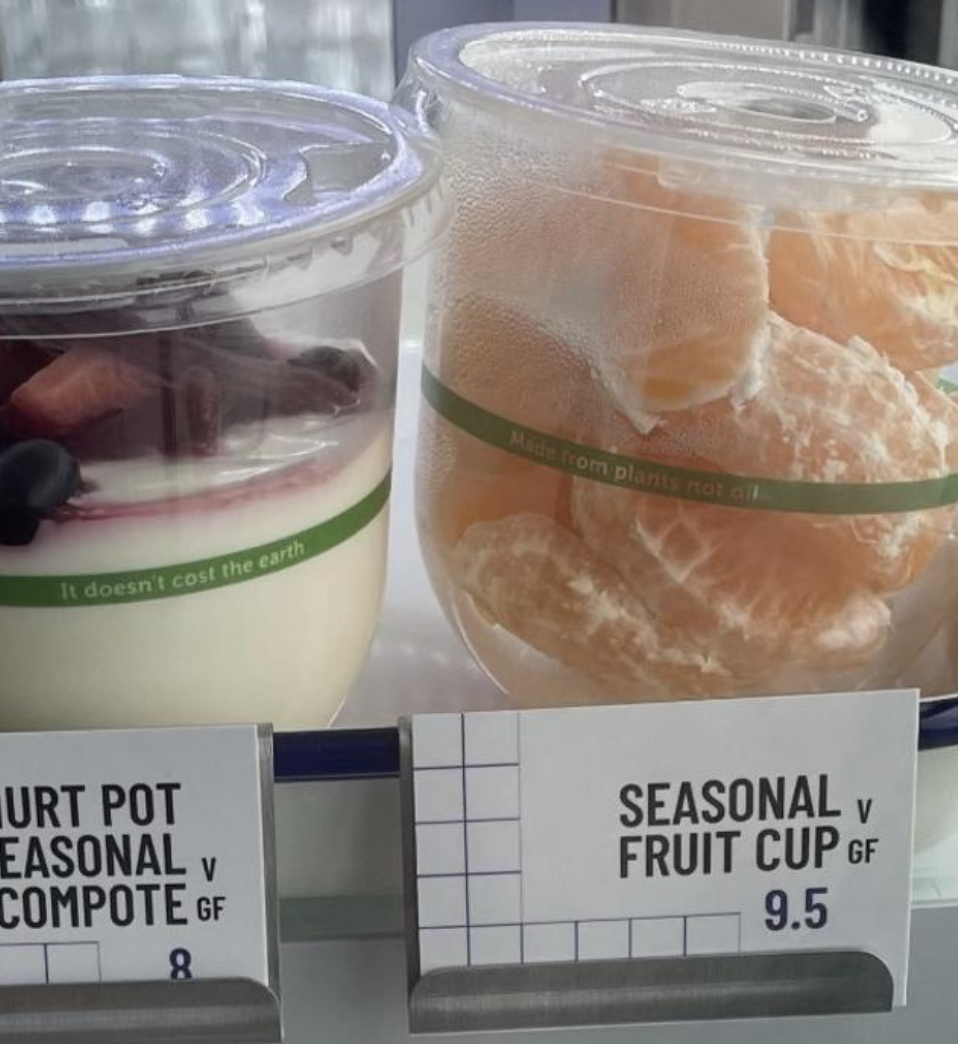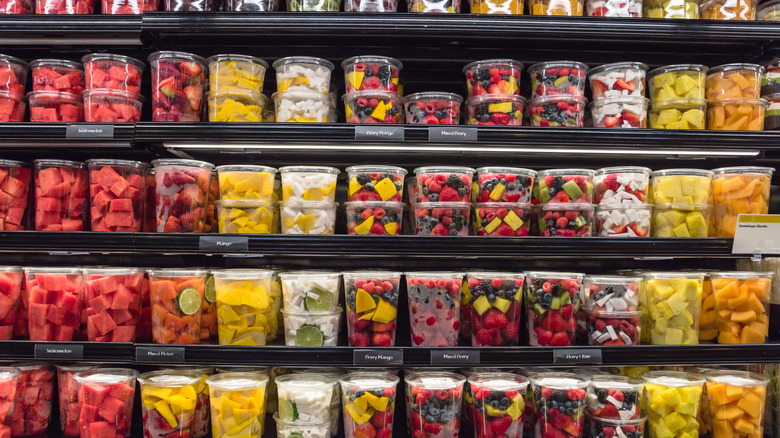Supermarket selling pre-peeled fruit in plastic container draws flak from shoppers: 'Why?'
- Replies 13
A piece of fruit is like a sweet treat straight from Mother Nature. Fruit such as peaches and apples are easy to eat, and they also come in their own perfect natural wrapping.
That's why so many shoppers roll their eyes when they see pre-cut and pre-peeled fruit in plastic containers at the grocery store. Fruit already have their own packaging, so why take them off and replace them with plastic that goes into the landfill?
Even though major supermarkets have begun to phase out the usage of plastic bags in their stores, their fresh produce section is still brimming with products that come with single-use containers, Styrofoam trays, and lots and lots of plastic.
Just have a look at the picture below, which was taken by a shopper at a Sydney supermarket's fresh produce rack: a peeled mandarin sat in a clear BioPak cup on a shelf.
Even more surprising is that the piece of fruit, which usually costs between 30 and 50 cents when unpeeled, is being sold for $9.50, which is a crazy markup.

Peeled mandarins were significantly more expensive than their unpeeled counterparts. Credit: Twitter.
On Thursday, the picture of the pricey fruit cup made its way into Twitter, where it was met with a lot of shock and disbelief from fellow Aussie shoppers.
'A mate just sent me this; no surprise it's in the Eastern Suburbs. It's a peeled mandarin in a cup,' said the user in their post.
Many people commented on the tweet, calling it absurd.
'If only nature had a way of serving this up, so we didn't need so much plastic,' one of the users wrote in response. Given the unbelievably huge markup in price, some people even went as far as to say that it was daylight 'robbery'.
Why do supermarkets sell pre-cut fruit?
In response to the tweet, another person pointed out that pre-peeled fruit and vegetables are made available for customers with disabilities, such as those who have weak hand strength or arthritis.
It may seem odd to buy a mandarin already peeled, but some have argued that it is no different from buying pre-cut, pre-washed salad greens, or de-shelled seeds. They're meant for folks who may not have the means or abilities to consume them normally.

Supermarkets offer a wide range of fully prepared fruit and veggies. Credit: Shutterstock.
But for able-bodied customers, the higher price of fully prepped food isn't the only reason to pass it up (although that alone is clearly reason enough); there are a ton of other solid reasons why it's best to leave those pre-packaged things on the grocery store shelf rather than adding them to your cart.
So you heard it here, folks! Before you give up on pre-cut fruit and vegetables and start asking your local stores to stop selling them, you should know that there is a very good reason why they are still on the shelves.
Having access to pre-cut items can be a lifesaver for people with mobility problems, and can make the difference between preparing a home-cooked meal and resorting to frozen options.
What do you think? Share your thoughts with us in the comments section below!
That's why so many shoppers roll their eyes when they see pre-cut and pre-peeled fruit in plastic containers at the grocery store. Fruit already have their own packaging, so why take them off and replace them with plastic that goes into the landfill?
Even though major supermarkets have begun to phase out the usage of plastic bags in their stores, their fresh produce section is still brimming with products that come with single-use containers, Styrofoam trays, and lots and lots of plastic.
Just have a look at the picture below, which was taken by a shopper at a Sydney supermarket's fresh produce rack: a peeled mandarin sat in a clear BioPak cup on a shelf.
Even more surprising is that the piece of fruit, which usually costs between 30 and 50 cents when unpeeled, is being sold for $9.50, which is a crazy markup.
Peeled mandarins were significantly more expensive than their unpeeled counterparts. Credit: Twitter.
On Thursday, the picture of the pricey fruit cup made its way into Twitter, where it was met with a lot of shock and disbelief from fellow Aussie shoppers.
'A mate just sent me this; no surprise it's in the Eastern Suburbs. It's a peeled mandarin in a cup,' said the user in their post.
Many people commented on the tweet, calling it absurd.
'If only nature had a way of serving this up, so we didn't need so much plastic,' one of the users wrote in response. Given the unbelievably huge markup in price, some people even went as far as to say that it was daylight 'robbery'.
Why do supermarkets sell pre-cut fruit?
In response to the tweet, another person pointed out that pre-peeled fruit and vegetables are made available for customers with disabilities, such as those who have weak hand strength or arthritis.
It may seem odd to buy a mandarin already peeled, but some have argued that it is no different from buying pre-cut, pre-washed salad greens, or de-shelled seeds. They're meant for folks who may not have the means or abilities to consume them normally.
Supermarkets offer a wide range of fully prepared fruit and veggies. Credit: Shutterstock.
But for able-bodied customers, the higher price of fully prepped food isn't the only reason to pass it up (although that alone is clearly reason enough); there are a ton of other solid reasons why it's best to leave those pre-packaged things on the grocery store shelf rather than adding them to your cart.
- They are not as nutritious and vitamin-packed as other fresh produce.
- They have a shorter shelf life.
- They can pose a risk when it comes to foodborne illness.
- They have a bigger carbon footprint.
- You may take them away from people who really need them.
So you heard it here, folks! Before you give up on pre-cut fruit and vegetables and start asking your local stores to stop selling them, you should know that there is a very good reason why they are still on the shelves.
Having access to pre-cut items can be a lifesaver for people with mobility problems, and can make the difference between preparing a home-cooked meal and resorting to frozen options.
What do you think? Share your thoughts with us in the comments section below!







